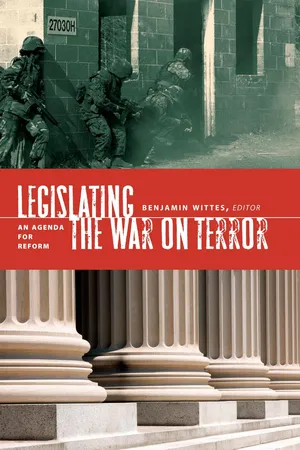
- 420 pages
- English
- PDF
- Available on iOS & Android
About This Book
The events of September 11 and subsequent American actions irrevocably changed the political, military, and legal landscapes of U.S. national security. Predictably, many of the changes were controversial, and abuses were revealed. The United States needs a legal framework that reflects these new realities. Legislating the War on Terror presents an agenda for reforming the statutory law governing this new battle, balancing the need for security, the rule of law, and the constitutional rights that protect American freedom.
The authors span a considerable swath of the political spectrum, but they all believe that Congress has a significant role to play in shaping the contours of America's confrontation with terrorism. Their essays are organized around the major tools that the United States has deployed against al Qaeda as well as the legal problems that have arisen as a result.
• Mark Gitenstein compares U.S. and foreign legal standards for detention, interrogation, and surveillance. • Matthew Waxman studies possible strategic purposes for detaining people without charging them, while Jack Goldsmith imagines a system of judicially reviewed law-of-war detention.
• Robert Chesney suggests ways to refine U.S. criminal law into a more powerful instrument against terrorism. • Robert Litt and Wells C. Bennett suggest the creation of a specialized bar of defense lawyers for trying accused terrorists in criminal courts.
• David Martin explores the relationship between immigration law and counterterrorism.
• David Kris lays out his proposals for modernizing the Foreign Intelligence Surveillance Act.
• Justin Florence and Matthew Gerke outline possible reforms of civil justice procedures in national security litigation.
• Benjamin Wittes and Stuart Taylor Jr. investigate ways to improve interrogation laws while clarifying the definition and limits of torture.
• Kenneth Anderson argues for the protection of targeted killing as a counterterrorism tool.
How should Congress authorize, regulate, and limit counterterrorism tools, and under what circumstances should it permit and encourage their use? The authors of this book share a commitment to pushing a reluctant Congress to play a more active role than it has to date in writing the rules of the road.
Frequently asked questions
Information
Table of contents
- Front Cover
- Copyright Information
- Table of Contents
- Acknowledgments
- Introduction
- Nine Democracies and the Problems of Detention, Surveillance, and Interrogation
- Administrative Detention: Integrating Strategy and Institutional Design
- Long-Term Terrorist Detention and a U.S. National Security Court
- Optimizing Criminal Prosecution as a Counterterrorism Tool
- Better Rules for Terrorism Trials
- Refining Immigration Law's Role in Counterterrorism
- Modernizing the Foreign Intelligence Surveillance Act: Progress to Date and Work Still to Come
- National Security Issues in Civil Litigation: A Blueprint for Reform
- Looking Foward, Not Backward: Refining U.S. Interrogation Law
- Targeted Killing in U.S. Counterterrorism Strategy and Law
- Contributors
- Index
- Back Cover